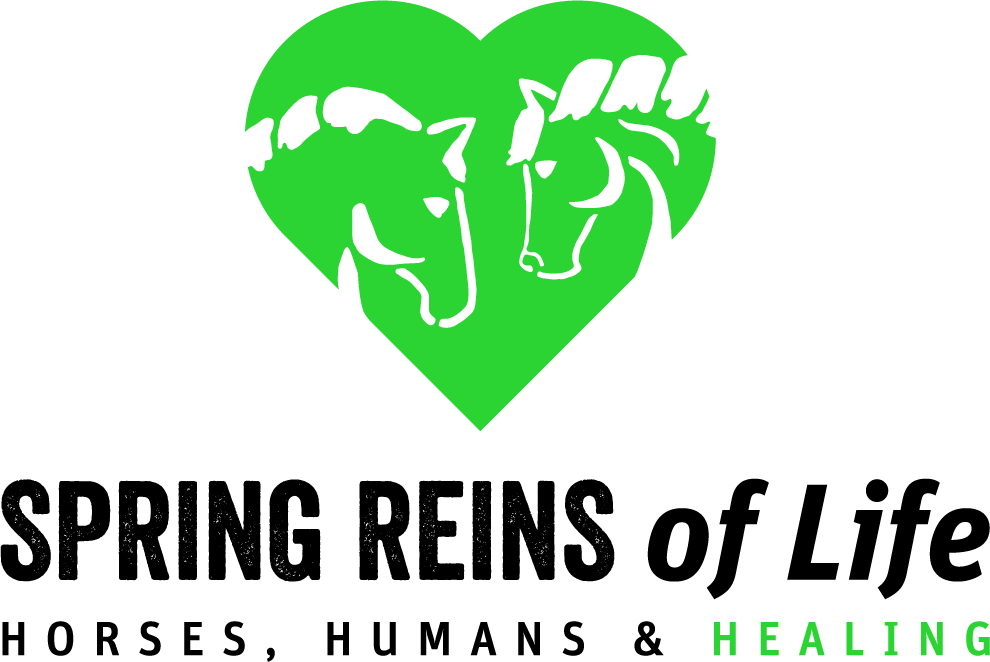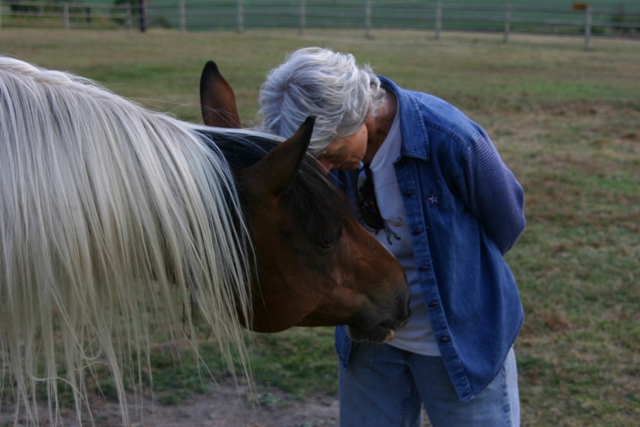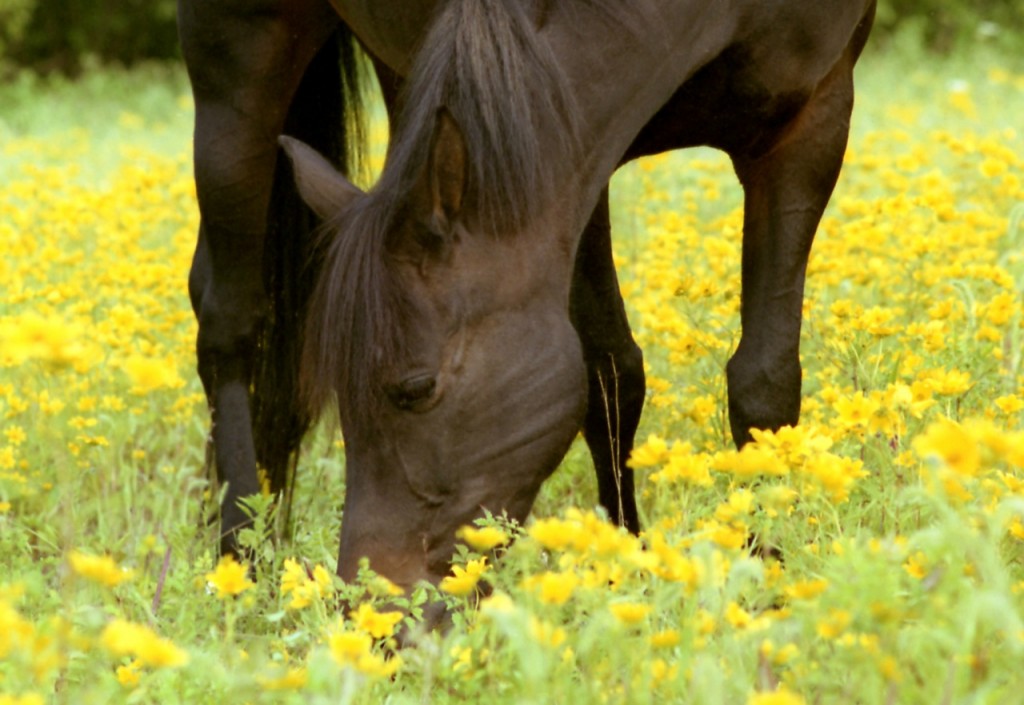What is Equine Assisted Psychotherapy (EAP)?
Because we all share this planet earth, we have to learn to live in harmony and peace with each other in nature. Thisis not a dream, but a necessity. Never give up. Develop the heart. Too much energy is spent developing the mind instead of the heart. Be compassionate, not just to your friends but to everyone. Be compassionate. Work for peace in your own heart and in the world. Work for peace. Never give up. No matter what is happening. No matter what is going on around you. Never give up.
~ His Holiness, The Dalai Lama (and the horses)
Animal Assisted Therapy has been endorsed by the American Psychological Association (APA), Section 17, Division 13; and by the Equine Assisted Growth and Learning Association (EAGALA) as a viable option for self-exploration and growth…
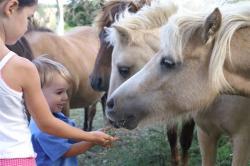 Equine Assisted Psychotherapy (EAP) incorporates horses for emotional growth and healing. It is a collaborative effort between a licensed therapist as the Mental Health Professional (MHP), an Equine Specialist (ES), and the Horse(s) working with the client(s) to address treatment goals. Unlike traditional psychotherapy, the use of the horses provides an intense “short-cut” to revealing core issues, through non-verbal awareness, allowing the clients to recognize and resolve emotional/behavioral patterns. Animals can bypass the underlying trust issues that complicate relationships with humans. Horses offer a non-judgmental view into our self inflicted limiting beliefs and offer a new perspective on how to overcome them.
Equine Assisted Psychotherapy (EAP) incorporates horses for emotional growth and healing. It is a collaborative effort between a licensed therapist as the Mental Health Professional (MHP), an Equine Specialist (ES), and the Horse(s) working with the client(s) to address treatment goals. Unlike traditional psychotherapy, the use of the horses provides an intense “short-cut” to revealing core issues, through non-verbal awareness, allowing the clients to recognize and resolve emotional/behavioral patterns. Animals can bypass the underlying trust issues that complicate relationships with humans. Horses offer a non-judgmental view into our self inflicted limiting beliefs and offer a new perspective on how to overcome them.
According to Mehrabian’s communication study; only 7% of what we say verbally with words actually communicates, 38% is based on tone of voice and 55% is communicated through body language. This is where we believe the horses can help us to develop immensely improved communication skills…
Equine Assisted Psychotherapy (EAP) is experiential in nature such as ropes courses used by therapists, treatment facilities, and personal enhancement courses around the world. It is through the interaction and activities with the horses, that participants learn about themselves and others and then “process” or discuss behavioral and emotional patterns. Horses offer a unique interactive experience because of their ability to mirror and reflect the client’s emotional state.
EAP is a powerful and effective therapeutic approach that has an incredible impact on individuals, couples, families, youth, and groups as it addresses a variety of mental health and developmental needs. To date, this field continues to expand and, with ongoing research trials underway, suggests great promise.
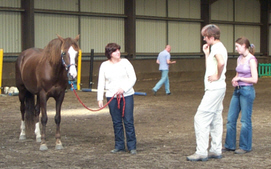 At Spring Reins of Life, we have integrated Equine Assisted Psychotherapy to help people identify problems, overcome obstacles, and find their own path to living a full and enriched life. Below are various sessions we offer in specialty; however we can fully customize a treatment plan to meet your needs. We also work very well in tandem or as an adjunct service to your current therapeutic plan. All scheduled sessions begin with a privately scheduled pre-screening or consultation which can include your current mental health professional / therapist to be a part of the treatment plan.
At Spring Reins of Life, we have integrated Equine Assisted Psychotherapy to help people identify problems, overcome obstacles, and find their own path to living a full and enriched life. Below are various sessions we offer in specialty; however we can fully customize a treatment plan to meet your needs. We also work very well in tandem or as an adjunct service to your current therapeutic plan. All scheduled sessions begin with a privately scheduled pre-screening or consultation which can include your current mental health professional / therapist to be a part of the treatment plan.
Spring Reins of Life employs the efforts of the horses to help people with their personal growth, positive healing and lasting change. With the help of the horses we are able to provide the following opportunities:
Build Confidence
Learning and mastering new skills with large animals such as horses enhances the client’s confidence and ability to tackle new projects/challenges.
Renew or Establish Self-Efficacy
Learning to communicate and achieve an aspect of harmony with a horse promotes renewed feelings of empowerment, replacing feelings of hopelessness with motivation.
Increase Self-Awareness
Interacting with the horses offers the client many opportunities to become aware of their size, spatial boundaries and also the causes and effects of their thinking and actions.
Improved / Assertive Communication
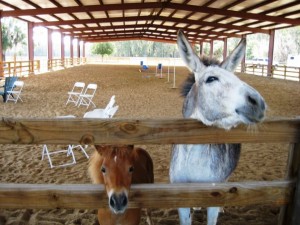 The horses’ sensitivity to non-verbal communication and signals assists the client in developing greater awareness of their emotions, body language, motives and is easily integrated toward other relationships in life. Communicating effectively with horses requires the client to demonstrate assertiveness, direction, focus and initiative. These are important traits that enable the client to express their needs and rights more effectively.
The horses’ sensitivity to non-verbal communication and signals assists the client in developing greater awareness of their emotions, body language, motives and is easily integrated toward other relationships in life. Communicating effectively with horses requires the client to demonstrate assertiveness, direction, focus and initiative. These are important traits that enable the client to express their needs and rights more effectively.
Trust (Send–Receive–Build)
Learning to interact with, communicate to, and work with horses is ultimately a lesson in building trust. With the horses trust starts with honesty, much like that in human relationships. Horses can lead the way to an understanding of trust, especially for those who have their trust violated in the past.
Gain Perspective
Through grooming and other focused activities with the horses, clients are able to put aside any tormenting or limiting beliefs for a moment and focus their attention toward a safe and caring interaction, which can then act as a stepping stone in other situations.
Decrease Anxiety
Many research studies have shown that human-animal interaction significantly reduces physiological anxiety levels. Even if the client is initially fearful of the horses – the horses’ genuineness and affection puts the fear to the background and allows an open door to embracing the calming effects the horses offer so freely.
Realize Acceptance and Assurance
For many individuals with emotional or behavioral problems there is either a long term or recent history of feeling isolated and rejected by others. The horses, with their non-judgmental and unconditionally accepting approach invites the clients back into the spirit of life. Also, sometimes there is a fear of embarrassment to try new things, so when clients observe the comfort that the horses show “just being themselves” they are able to relax with them and start to feel that too.
Gain Personal Control
Particularly for those whose issues involves the loss of control over impulses the need to communicate with a horse in a calm and non-aggressive manner promotes the skills of emotional awareness, emotion regulation, self-control, and impulse modulation.
Improved Social Skills
For those individuals who experience social isolation or withdrawal, a positive relationship with a horse is often a stepping stone toward practicing the social skills needed to build relationships and friendships with people. Horses are also social beings so they understand the need to belong.
Establishing Healthy Boundaries
Safe emotional boundaries can be a challenge for individuals who have experienced prior relationships that were controlling or abusive. Clients discover that interacting with the horses, within the context of a respectful and trusting relationship, can be healing. Also the size of the horse puts some effective physical boundaries to the forefront immediately. Horses utilize their size to teach ‘respect’ for physical boundaries and also provide opportunities to create and maintain your own healthy boundaries.
Creativity, Intuition and Freedom
Oftentimes, people with emotional, behavioral or social issues have been inhibited, over-controlled or intimidated to the point that they have lost some measure of spontaneity and freedom. The playful aspects that naturally occur when interacting with the horses can help to restore a spontaneous ability for healthy recreation and play. Having some fun and games with the horses can open up creative thinking, intuition and a chance to feel the freedom of the moment.
Psychologically this path to freedom is not always smooth or pleasant. Horses demand authenticity every step of the way. To be effective and to receive the gifts of this work with horses one needs to develop an alert yet meditative state of mind, creative approaches to problem solving, an ability to set long term goals without lapsing into impatience or the challenges that arise, or having assumptions about how success should happen. Horses respond to personal integrity, thoughtful leadership, mental and physical balance, emotional congruency, flexibility, receptivity, clear intent, and sophisticated energy management. They reward us when we attune to these virtues with increased attention, cooperation, and affection acting as unbiased barometers for human development.
“It excites me that no matter how much machinery replaces the horse, the work it can do is still measured in ‘horse power’…even in this space age. And although a riding horse often weighs half a ton, they can be led about by a piece of string if he has been wisely trained and respected. This to me is a constant source of wonder, and challenge.” ~ Marguret Henry
